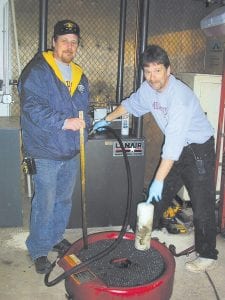Cook County Schools Maintenance Mechanic Tom Nelson (left) and Facilities and Transportation Director Mike Groth in front of the school bus garage furnace that is fueled by used motor oil. They are pumping fuel into the furnace from an air-powered oil handler that collects oil from school buses. Other sources of oil are the Cook County Highway Department, the City of Grand Marais’ power plant, and Steve’s Sports. The buses themselves provide about 28 days of heat for the building each year.

What if you didn’t have to pay for the fuel you use to heat your home? Your business? Your school bus garage? Good news! You, the taxpayer, are not paying for fuel to heat the Cook County Schools bus garage.
About six years ago, under the leadership of Facilities and Transportation Director Mike Groth, the school maintenance department installed in its shop a furnace fueled by used motor oil – the dirtier, the better.
The system works like a charm and burns very efficiently, leaving no fuel odors either inside or outside the building. This is the building’s sole source of heat except for a propane backup for the garage area and an electric heater used as needed in the office and bathroom area.
According to Groth, this is a big improvement over the fuel oil boiler they had before, burning both cleaner and more efficiently. “That was nothing but a maintenance nightmare,” said Groth.
The cost of the oil-burning furnace was, amazingly, about $6,000.

Preparing for Earth Day. In March, Cook County Girl Scouts— the Daisy and Brownie troops— conducted a beach sweep. After the messy work, the girls posed for a photo with some of the trash found on the beach and under boulders on Grand Marais’ east bay.
The school gets its oil from the Cook County Highway Department, the City of Grand Marais, and Steve’s Sports, saving those entities from having to pay to get rid of their waste oil. The city’s oil comes from its power plant generators, but when that oil is changed, it’s still so clean it has to be mixed with dirtier oil, because the particles in dirty oil help it burn better.
The furnace could burn used restaurant oil as well. While the oil is better if it’s dirty, it must be pure – it cannot have things like antifreeze, leaves, or water in it.
The bus garage goes through about 1,000 gallons of oil in a typical winter, but this winter it has only needed about 600 gallons. Used oil from the school buses themselves provides about 28 days of heat for the building each year, with oil on each of the seven buses getting changed about four times a year. “One bus oil change will buy us at least a day or two of heat in the cold of winter,” Groth said.

Far left: Brownie CeCe showed that she lives by the Girl Scout promise to “help people at all times” by picking up some unpleasant trash!
The system is maintained by Groth and Maintenance Mechanic Tom Nelson. It requires some know-how, some tinkering and some cleaning. To maintain the system, Groth said, “you’ve got to be a little handy.” The furnace could probably go about two weeks in cold weather before needing fuel. It kicks off if it senses that the flame is not good enough, and this can happen when the filter needs cleaning. Soot needs to be cleaned out about once a year.
The system requires no ongoing supplies such as disposable filters. “There’s nothing that goes in the trash or has to be thrown away,” said Tom Nelson, except for sediment that settles on the bottom of the tank. When this builds up, a company specializing in environmentally hazardous waste comes and picks it up.
School bus garage employees coming and going from the building stay comfortably warm. The thermostat is often set at about 57, but Groth said they “crank it up to tropical” when they are working on projects inside the building – turning up the thermostat all the way to 63 or 64 degrees. “It kicks out nice, dry heat,” said Groth.



Loading Comments